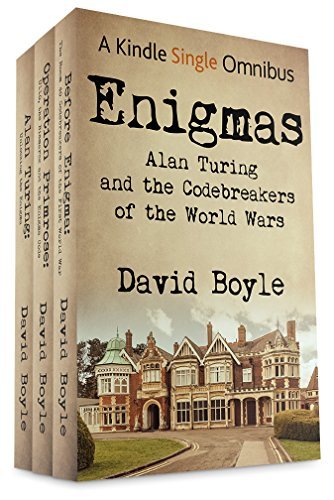Before Enigma During the First World War, a British code-cracking team paved the way for the successful code-breaking of the Second world War. Many of those most closely involved in cracking the Enigma code – Alistair Denniston, Frank Birch, Dilly Knox – had wrestled with German naval codes for most of the First World War. By the end of the war they had been successfully cracking a new code every day, from their secret Room 40 at the Old Admiralty Building, in a London blacked out for Zeppelin Raids. The techniques they developed then, the ideas that they came to rely on, the people they came to trust, had been developed the hard way, under intense pressure and absolute secrecy during the First World War. Operation Primrose Operation Primrose tells the story of the capture of U-110 – and with it a working Enigma machine. One of the biggest secrets of the war, the capture of that one machine turned the tide of the war. Turing and his colleagues at Bletchley Park worked tirelessly to crack the code, and with the working Enigma machine they finally had their break-through moment. This book sets the story, and the Enigma cryptographers, in context – at the heart of the Battle of the Atlantic, when it reached its crescendo in the pursuit of the battleship Bismarck the week after U110 was taken. It sets Bletchley Park in its wider context too, at the heart of an intricate and maverick network of naval intelligence, tracking signals and plotting them to divert convoys around waiting U-boats, involving officers like James Bond’s future creator, Ian Fleming. It also sets out the most important context of all, forgotten in so much of the Enigma that Britain’s own naval code had already been cracked, and its signals were being read, thanks to the efforts of Turing’s opposite number, the German naval cryptographer, Wilhelm Tranow. An exciting and enthralling true story ‘Operation Primrose’ is an excellently researched piece on the race for naval supremacy in the Second World War. Alan Turing Mathematician, philosopher, codebreaker. Turing was one of the most original thinkers of the last century - and the man whose work helped create the computer-driven world we now inhabit. But he was also an enigmatic figure, deeply reticent yet also strikingly naïve. Turing’s openness about his homosexuality at a time when it was an imprisonable offence ultimately led to his untimely death at the age of only forty-one. 'Alan Unlocking the Enigma' seeks to find the man behind the science, illuminating the life of a person who is still a shadowy presence behind his brilliant achievements. Turing was instrumental in cracking the Nazi Enigma machines at the top secret code breaking establishment at Bletchley Park during the Second World War. But his achievements were to be tragically overshadowed by his supposedly subversive views and for his sexuality. Praise for David ‘The tone of the book may be gloomy but there is plenty of entertainment value …’ - Anne Ashworth, The Times ‘Exhilarating’ - Daily Mail ‘He tells these stories, on the whole persuasively and with some startling asides.’ - New Statesman David Boyle is a British author and journalist who writes mainly about history and new ideas in economics, money, business and culture. He lives in Crystal Palace, London. His books include, 'Rupert E
